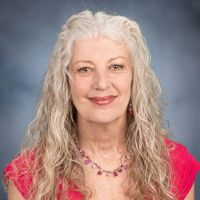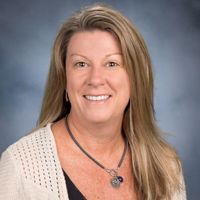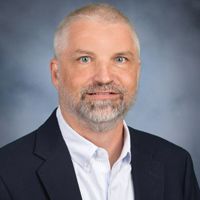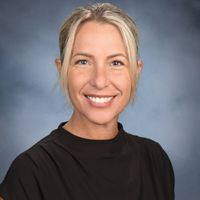Commencement Address from Fiona Clunan
Valedictorian of the Class of 2019
Good afternoon, everyone. Today is a consequential day in history: on this day in 1865, the Civil War officially ended, in 455, the Vandals sacked Rome, in 1989 Chinese citizens protested in Tiananmen Square, in 1953, Queen Elizabeth II was crowned, and today, we are graduating from Cape Henry.
For such a momentous occasion, I feel slightly unfit to be the one to provide a strong moral statement that will provide mentality-altering inspiration for you as you approach life beyond high school. After all, I’m only seventeen years old and in many ways, I can really relate to that dumb-blonde stereotype. No matter how much Advanced Calculus I take, my common sense skills are still a bit lacking. Also, since I’m somewhat uncertain why doing well in a lot of AP classes and not taking physics (sorry, Mr. Rodgers), lends me some sort of moral authority to speak before you at graduation, I think I’m better off just talking about my love of an already established Cape Henry core value: community.
Community was a central theme of my Nexus trip to Peru last summer. My friends and I stayed in a high-altitude village called Patacancha. There, life isn’t easy: we thought we had it tough mixing cement to build a kitchen in the cold rain, but there every day residents must walk miles upon miles uphill to their alpaca ranging grounds and experience backbreaking work as potato farmers toiling on mountain terraces. They survive through a system called ayni, best translated as reciprocity. It means that when an individual is in a time of need, all other villagers come to his/her aid without expecting anything tangible in return. For example, if a farmer is struggling to harvest his entire crop of potatoes or if a new family needs to build a bathroom, the rest of their community will help them do so. There is faith that if the individual works for the benefit of others in the community, the community will help the individual in times of difficulty.
Cape Henry practices ayni as well. On an individual level, I’ve loved helping my friends with math problems or Spanish, and my close friendships were the only thing keeping me sane through the all-nighters I pulled junior year. Teachers like Mr. McGraw, who granted me extensions on assignments after I’d missed school for sports or other activities, helped me succeed in academics so that I could give back by remaining enthusiastic and excited about the act of learning in their classes.
But what has influenced me most has been to watch others engage in ayni and give back to the community without expecting anything in return. James Tyler: can I give you a shoutout? You’re my inspiration. Not only have you scored higher than me in basically every single math competition this year, but you’re one of the best golfers to come through this school. Also, you’ve done what few others are capable of: passing AP Physics, what I consider a superhuman feat. But besides simply being a role model, James spends his free time delivering food from restaurants to help the less fortunate. James, if there’s one high-school senior mature enough to dispense wisdom, it’s you. Also, can I mention Jamie Friedman? Jamie, your unwavering passion for improving the school community has made me even more excited to be a Cape Henry student. And Peter Pan, I hope you know how inspiring your activism has been to me and the rest of the community. And Grace Fluharty and Aidan Kale, your performances have added incredible vibrancy to school life.
Not only have we given much to the school community, but we’ve each been paid back tenfold. Ayni goes two ways, as individuals both contribute to and benefit from the community. I’ve benefited from Cape Henry in a myriad of ways, but especially from the school’s flexibility. It has allowed me to design a unique path of success for myself. I’ve traveled to other countries and taken a variety of language classes – opportunities unavailable at other places – because of this flexibility.
My Linear Algebra class is also a good example of how such flexibility made learning engaging and rewarding. We were able to learn math in-depth while developing skills like cryptography and exploring various conspiracy theories on the side. You might have seen the numerous matrices posted around the hallways over the course of the year. Yes, we encrypted several of those to say something along the lines of “The Moon Landings were Faked” and “The Illuminati Control the World Order.” We the students, with the help of our fantastic teacher, Mr. Rudolph (whom I’ll note was not involved in the conspiracy theories), made that class our own and learned far more than we could’ve imagined about the intricacies of linear algebra and also alleged plots to take over the world. I believe that Cape Henry’s ability to mold itself to us and our interests, whether they be learning about other cultures or studying other branches of math, is why we’ve gotten so much out of our years here, and how we’ve gotten where we are, headed to not only the best colleges in the world but the best colleges for ourselves individually.
My hope is that we attribute our success not only to our hard work but also to those around us. Reciprocity has been a key factor in our success. Without the school community around me, and the privilege of being raised by encouraging and involved parents who supported my educational goals, I doubt I would be speaking to you now. Our environment, especially our Cape Henry environment, has shaped who we are. Therefore, I hope that we can recognize that we owe our success in part to our environment, and that we should continue devoting ourselves to improving our environment, which includes any community we join.
One of my favorite quotations is from Dr. Martin Luther King Jr.’s famous Letter from Birmingham Jail, in which he wrote that “We are caught in an inescapable network of mutuality, tied in a single garment of destiny. Whatever affects one directly affects all indirectly.” He penned this while calling for all Americans to support the Civil Rights Movement, arguing that it would improve life in America for everyone. For many of us, our closest “network of mutuality” has been the Cape Henry community, which we have improved and which has improved our lives as well. And while for the next few years, our tightest “network of mutuality” will be our college, I also expect that we will increasingly realize King’s true meaning in his letter: that the whole country and really the whole world is “tied in a single garment of destiny”. Rather than embracing our individualism in the sense that each of us should look out only for ourselves, I hope that we will use our individualism to contribute something unique to society, so that we can guide the destiny of our communities and the whole world in a positive direction.
To sum it up, I’d like to close with the famous quotation “Shoot for the moon. Even if you miss, you’ll land among the stars.” Just kidding, that would be cliche and pointless, since the truth is, our class already has many who have “landed among the stars”. My hope, or rather my expectation, is that you all keep inspiring me and keep practicing the ayni, reciprocity, that has made Cape Henry the amazing place it is and will make the world a better environment in which to live. I can’t wait to see James come up with a solution to dramatically reduce world hunger, and for Nicole to devise a cure for HIV, and for Peter Pan to champion human rights around the world, and for Grace and Aidan to continue inspiring others on Broadway, and for Carolyn to lead the fight against climate change. I can’t wait to see us positively change the destiny of the world.
Thank you.



